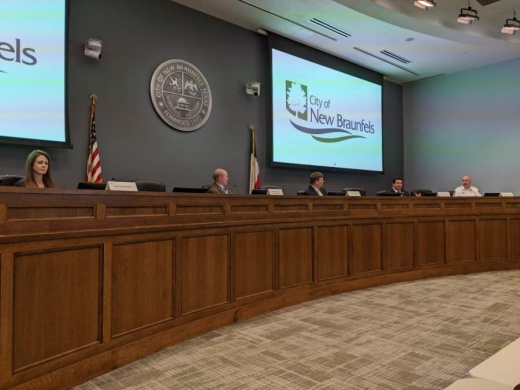The meeting touched on numerous aspects of the city's response to the coronavirus and gave the public its best look yet at Brockman, who will take office on May 26.
"I have a lot of faith in God and I have a lot of faith in our community because our community was founded based on a good religious background," Brockman said. "That has continued through our community over 175 years."
Brockman was formerly the director of economic development for the New Braunfels Chamber of Commerce for 17 years.
According to the mayor-elect, the city is working with the Chamber of Commerce, New Braunfels Utilities and Economic Development Foundation on a plan to help small businesses recover from closures.
"We've never done this before and none of us have ever been through an issue like this," Brockman said. "But if we all work together and we help where we know we can, and we help with the resources that we have as a community, it will make everybody's job getting back to normal a little bit easier, a little bit faster."
Brockman noted the recent City Council vote to waive certain fees and allow businesses to move some operations onto their sidewalks, which wouldn't count toward the state's current occupancy restrictions. Brockman also pointed out that funding had been approved for the Spark Small Business Center so it can increase its staff that assist local business owners.
"What's most important at this time—and what one of my goals is—is to help the local folks," Brockman said. "If we can do that with funds that we have here in our community, then it's extremely important for us to step up and to be able to give that."
When asked about potential property tax breaks, Casteel said that 60% of collected property taxes go toward public education because of state law, but he did not address the remaining 40% and whether it could be redirected to aid local property owners.
City and 4B funds were also mentioned as possible sources of assistance that were under consideration.
"We can't fill their needs to hundreds of thousands of dollars, but we can help and assist on levels where people who are hurting and need to just turn the lights on right now and get back to work," Brockman said. "We can't do it by ourselves. Council can't do it by themselves. It takes a team effort."
Resources and restrictions going forward
On the subject of medical supplies, Fire Chief Patrick O'Connell was praised for ordering PPE when the pandemic first hit New Braunfels in mid-March.
"We received two allotments of personal protective equipment from [Texas Department of State Health Services] Region 8 and that has been distributed from our emergency operations center to local primary care physicians that have requested it," O'Connell said. "We have an ample supply of that still so we're in good shape as we move into the next phase of reopening."
According to O'Connell, the city also has a strong supply of COVID-10 testing kits from multiple labs.
Casteel and O'Connell also noted that the McKenna Foundation purchased a large quantity of tests for the city in the early days of the pandemic when kits were harder to acquire.
"The Mckenna Foundation actually funded 1,000 tests kits early on when we were having a hard time getting test kits from the traditional labs," O'Connell said.
O'Connell also said that New Braunfels first responders were part of a task force that has provided 400 tests in nursing homes in Region 8 of Texas, with more testing on the way.
"We received a request from the Texas Division of Emergency Management to assist the testing of all nursing homes and nursing home staff within the city of New Braunfels," O'Connell said. "We'll begin that process very soon."
According to a press release issued by the city, testing of 1,600 Comal County residents living in nursing homes will begin in the upcoming week and will be administered by two three-person teams and a supervisor from the New Braunfels Fire Department.
When asked how a potential spike in cases could be handled in the future, Brockman pointed to the state as the party responsible for any future measures.
"The governor's office has appointed those strike teams to be able to handle some of those issues where they see the hot spots that might begin to show up now that things are reopening," Brockman said.
Other cities such as Austin and San Antonio have been decried by Attorney General Ken Paxton for keeping some restrictions in place that went beyond Abbott's orders, the reason being that these cities had yet to see a major decline in the rate of infections.
"We cannot do anything that is in conflict with the governor's executive order," said City Manager Robert Camareno. "If it's a city facility, then we certainly could take a look at changing operations or require certain things."
Casteel said that if it became a larger issue in the future, the city would work with Texas Senator Donna Campbell and other state representatives to evaluate local health care facility usage and contact-tracing of infected individuals.
"We're most certainly going to see instances of new cases, and that's a product of increased testing and that's a good thing," O'Connell said. "The more people that we test, we identify those people that are ill with COVID-19 and they can be isolated and we can do contact-tracing... and reduce these outbreaks and surges."





